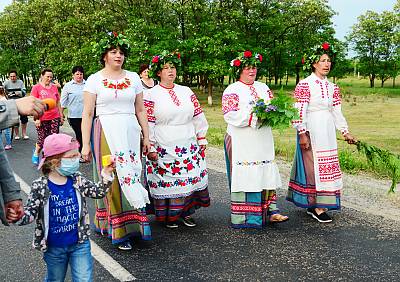Some traditional practices have been canceled or postponed. There are traditional rites which have a certain time frame. The pandemic has an influence on the creative industries too.
Many concerts and events with the participation of bearers have been canceled. Up to 40 000 pilgrims visit Budslaŭ during the Celebration in honor of the Budslaŭ icon of Our Lady every second weekend of July. So, the ceremony has been postponed. The celebration will take place after the normalization of the epidemiological situation.
The folk art festival “Berahinia”, which is one of the best practices for safeguarding intangible cultural heritage in Belarus, was postponed. The festival will be held in 2021. The annual Festival of National Cultures in Grodno will also be canceled this year.
A number of rites and ceremonies were carried out despite the pandemic. Some local communities have decided not to put off traditional annual practices, because these practices have a significant role for community identity. However, the rites were adapted to the situation.
On May 6, 2020 the Spring Rite of Juraŭski Karahod was performed by residents of the Village of Pahost in Gomel Region. The rite was inscribed in 2019 on the List of Intangible Cultural Heritage in Need of Urgent Safeguarding. Usually, the ceremony takes place with many visitors, but this year only bearers took part.
The Rite of ‘Provady Rusalki’ (Farewell to the Mermaid), which is held every year on Sunday after Holy Trinity Day in Vialiki Bor village of the Gomel Region, was also held in a more reduced format this year.
The Rithual Bypass of the Yards on Trinity Day (“Vadžennie Kusty”) in the village of Lobča in Brest Region has also been a little transformed. The ceremony was attended by half as many bearers as usual. The participants just passed along part of the village.
Scientific institutions are committed to study the pandemic expressions through folklore. The National Academy of Sciences of Belarus has launched a project to collect folklore as a response to the pandemic threat. Drawings, graffiti, jokes, songs, poems, as well as diaries in which their authors tell about living in self-isolation will become a part of the Archive of the Department of Folkloristic and Culture of the Slavic Peoples.
Les désignations employées et la présentation des textes et des documents référencés dans cette plateforme n'impliquent de la part de l'UNESCO aucune prise de position quant au statut juridique des pays, territoires, villes ou zones, ou de leurs autorités, ni quant au tracé de leurs frontières ou limites.
